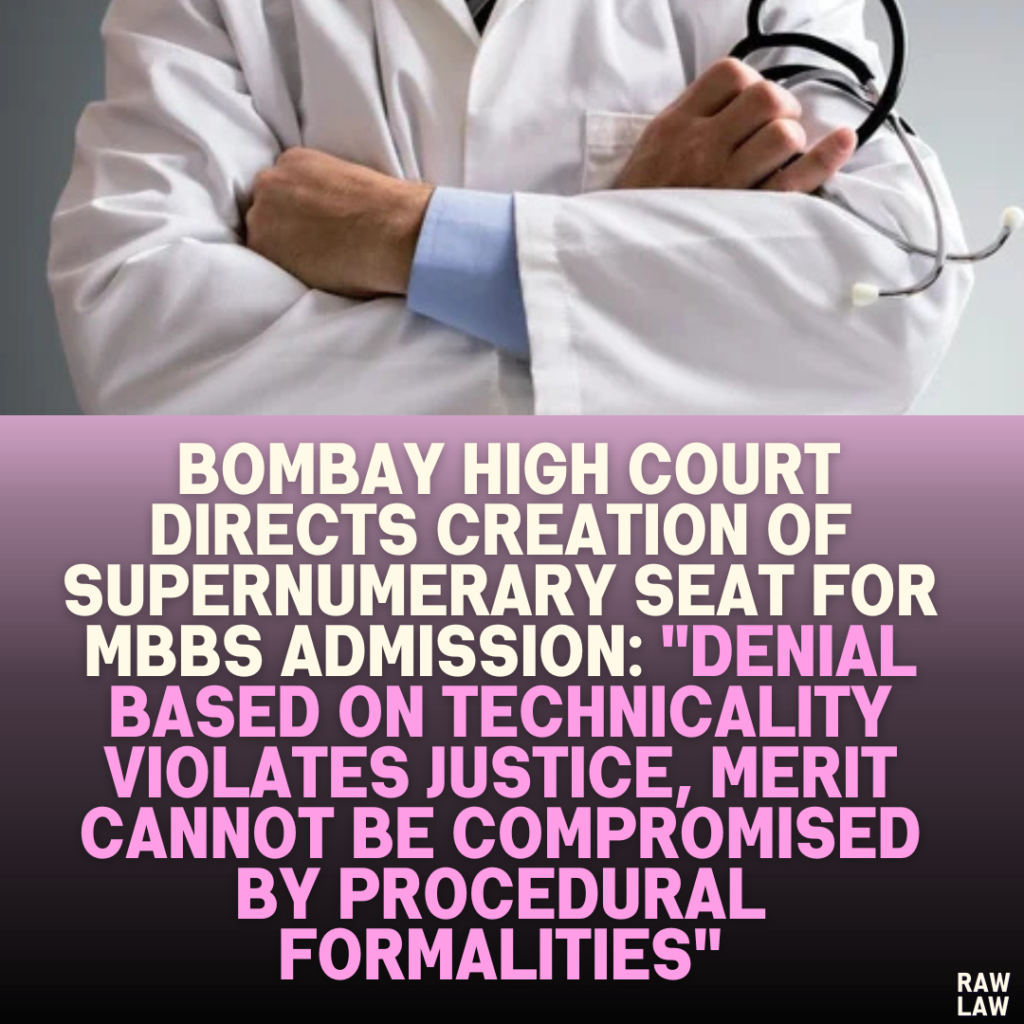Court’s Decision
The Bombay High Court decided in favor of the petitioner, who was denied admission due to a mismatch in caste certification documents. The court directed the creation of a supernumerary seat for the petitioner, ensuring that her admission to the MBBS course was secured despite procedural hurdles. The court underscored that denying admission solely on technical grounds was unjust, especially when the petitioner met the substantive requirements.
Facts
- Petitioner’s Background:
- The petitioner, a member of the Other Backward Class (Mali caste), was eligible for admission based on her NEET-UG 2024 results.
- She participated in the Institutional Level Stray Vacancy Round and was included in the general waiting list.
- Certification Issue:
- The petitioner possessed a valid Caste Validity Certificate issued by the Scrutiny Committee in 2022.
- However, this certificate referenced an earlier Caste Certificate (from 2021), which the petitioner could not produce because it was misplaced.
- She submitted a new Caste Certificate (from 2024), but the college rejected it, stating that the referenced 2021 certificate was mandatory.
- Outcome of Denial:
- Admission was denied, and by the time the petitioner approached the court, the cut-off date for admissions (November 5, 2024) had passed, and all seats were filled.
Issues
- Validity of Denial:
- Was it legally correct for the college to deny admission due to non-production of the specific Caste Certificate referenced in the Validity Certificate?
- Exceptional Relief:
- Could the court grant admission after the cut-off date by creating an additional (supernumerary) seat to remedy the injustice?
Petitioner’s Arguments
- Sufficiency of Validity Certificate:
The petitioner’s counsel argued that the Caste Validity Certificate conclusively established her caste status, making the earlier certificate a redundant formality. - No Fault of the Petitioner:
The inability to produce the earlier certificate was due to circumstances beyond the petitioner’s control, and she had acted promptly in submitting an alternative document. - Timely Application:
The petitioner had approached the college before the cut-off date and was denied admission without a valid reason. - Reliance on Precedent:
The counsel cited S. Krishna Sradha v. State of Andhra Pradesh (2020), which allows courts to grant relief in cases of wrongful denial of admission.
Respondent’s Arguments
- College’s Defense:
- The college justified the denial based on the petitioner’s failure to submit the specific Caste Certificate referenced in her Validity Certificate.
- It claimed that no seats were available after the cut-off date.
- Rejection of Allegations:
- The college denied allegations of deliberate denial or wrongful conduct, asserting that their decision was in line with procedural requirements.
Analysis of the Law
- The court examined the Maharashtra Caste Certificate Act, 2000, which emphasizes the sufficiency of a Validity Certificate in confirming caste claims.
- It held that requiring a specific older certificate referenced in the Validity Certificate was unnecessary, as the petitioner had already established her caste status.
Precedent Analysis
The court relied on the Supreme Court’s decision in S. Krishna Sradha and Vansh s/o Prakash Dolas v. Ministry of Education (2024), which allow courts to grant exceptional relief by creating additional seats. The precedents affirm that procedural lapses should not deprive meritorious students of educational opportunities. The court also referred to similar cases where restitutive justice was granted to ensure fairness.
Court’s Reasoning
- Merit Over Technicality:
- The court observed that the petitioner’s caste status was undisputed and verified by competent authorities.
- Denying admission based on the absence of a specific referenced certificate was a procedural technicality, which should not outweigh the petitioner’s substantive eligibility.
- Exceptional Circumstances:
- Since no seats were available and the cut-off date had passed, the court recognized this as an exceptional case requiring the creation of a supernumerary seat to ensure justice.
- Prevention of Arbitrary Actions:
- The court emphasized that procedural barriers should not override fairness, particularly when the petitioner had no fault in the situation.
Conclusion
The court directed the respondent college to admit the petitioner by creating a supernumerary seat. It also mandated the college to regularize the petitioner’s admission by forwarding the necessary proposal to regulatory authorities.
Implications
- Restitutive Justice:
- The judgment reinforces the principle that courts can create remedies for wrongful denials of admission, ensuring fairness to meritorious students.
- Reduced Procedural Rigor:
- Educational institutions are reminded to avoid rigid adherence to procedural formalities at the cost of equity and merit.
- Broader Educational Fairness:
- The decision strengthens the protection of students’ rights in admission processes, setting a precedent for similar cases.




Pingback: Bombay High Court Quashes Interim Relief for Delay in Filing Application Under Arbitration Act: "Tribunal Ignored Nine-Year Lapse and Prejudice to Petitioners While Granting Relief" - Raw Law
Pingback: Allahabad High Court Rules Licence Fees Cannot Be Recovered as Arrears of Land Revenue: "Recovery Must Be in Accordance with the Law" - Raw Law